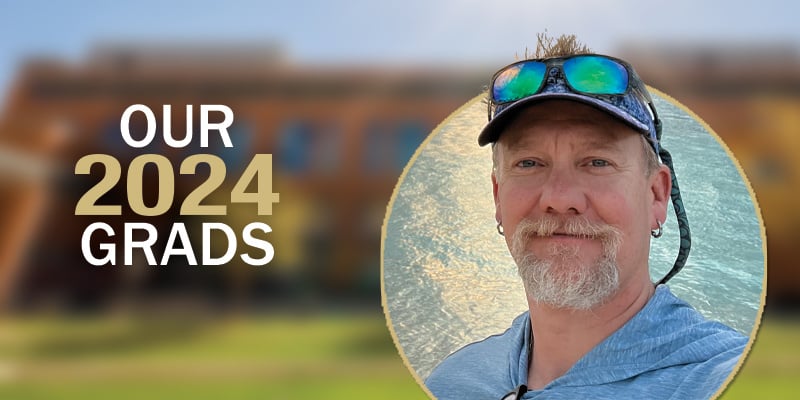Long before he became a PhD candidate at the University of Colorado College of Nursing at Anschutz Medical Campus, Murphy Anderson’s life was defined by separation – a childhood spent moving between different homes and different families, far from his brothers. After moving from a farm in rural Colorado to Five Points in Denver, he finally reunited with his mom and found his footing.
Anderson graduated early from East High School and, thinking it was his only option, entered the Navy at age 18, setting him on a path to a career in healthcare.
From Desert Storm to Denver’s Heights
During Operation Desert Storm, Anderson found himself testing his medical training under the most demanding circumstances imaginable. For six and a half months, he served alongside the Marines, learning lessons that would shape his future.
“My entire military experience taught me the importance of training and continuing to push yourself to expand your own personal knowledge. The old saying ‘knowledge is power’, is not cliche, it’s essential and was for my journey,” he says.
This drive for excellence followed him through civilian roles as a respiratory therapist, work in a hyperbaric chamber, and a career in nurse anesthesia.
“These experiences fueled the drive to accomplish more,” he says. But it was a seemingly routine blood test that would lead to his most ambitious challenge yet.
The Mystery in the Blood and a Passion Project Leads to a PhD
While working at Denver Health, Anderson encountered a troubling problem: the TEG (Thromboelastography) blood-clotting test, crucial for patient care, was yielding concerning results in pregnant women.
While this test was beneficial, its application during pregnancies caused an increase in maternal hemorrhage incidents. The problem? No one had established normal ranges for pregnant women, whose hormone levels and coagulation factors differ significantly.
 Murphy Anderson with his daughters. Murphy Anderson with his daughters. |
What began as a simple question – "Why aren't you earning your PhD?"— transformed into an eight-year journey and soon became a catalyst for change.
“I was doing all of this research on the side,” Anderson explains. “It was something I felt was important and needed to be done, so a passion project turned into me earning my PhD.”
A Legacy of Learning
Perhaps the most poignant chapter in Anderson’s story unfolds not in a hospital or laboratory, but at his own dining room table, where he studies with his 19-year-old daughters.
“While I was earning my PhD in Bio-behavioral Sciences, I had the opportunity to study with my daughters. I would work on my PhD, and they would work on their homework, so we’d sit at the table and work together. Finishing my PhD is very meaningful to me, and I’m fortunate that my wife and kids really supported me through this process. That’s what has really pushed me to give back.”
After 35 years in healthcare and guided by mentors like Dr. Teresa Hernandez, who “inspire me to pay this forward,” Anderson has come full circle.
The man who once needed support now mentors others, sharing wisdom gained from a lifetime of service.
“I feel like it’s part of my responsibility,” he says, “especially since I’ve been doing this for so long – to pass on what I’ve learned. I’m still here doing this and wanting to be a nurse, and that’s what drives me to give back.”



